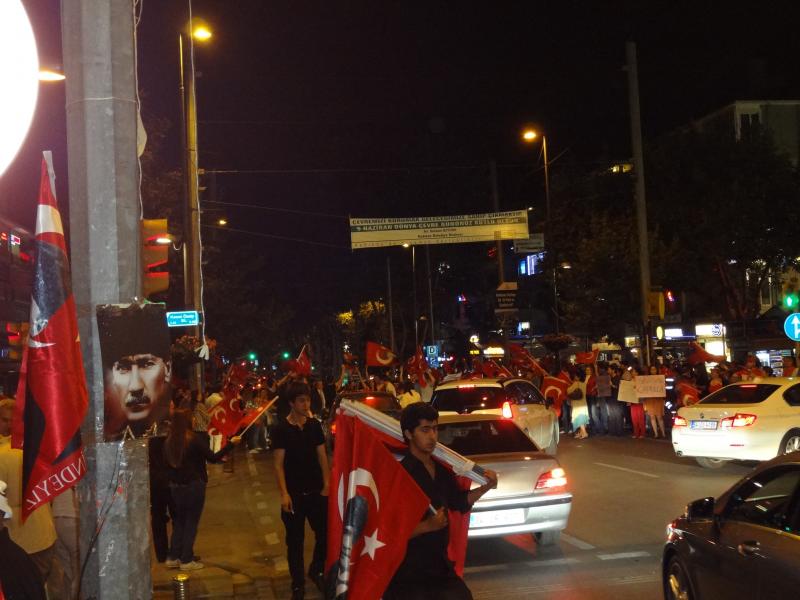Turkish Protestors On Prime Minister Erdogan

I knew that policies like alcohol prohibition during certain hours and restructuring of historic areas were unpopular, but I learned that most people are engaging in a targeted battle with one person: Prime Minister Erdogan.
I walked down Bagdat St., an area that has a similar vibe to Taksim, its Asian counterpart. Many shops and restaurants line the street and during the day it seems like business as usual except for the many waving flags and graffitied messages.
I spoke with Canon Terziglu, a 32-year-old administrative employee who has been paying close attention to the protests over the past few weeks. I asked her why so many were angry with Prime Minister Erdogan and she gave me an expression that said she didn’t quite know where to start.
She mentioned the alcohol policy still awaiting approval and the reconstruction of Gezi Park into a shopping mall, but she explained that there was more anger about Erdogan’s general behavior.
Terziglu said that he often used inflammatory speech, like “street girls,” which has a derogatory connotation when translated into Turkish. According to Terziglu. this is the term the Prime Minister called any woman protesting in the streets. He also once called one of the most endeared Turkish historical figures, Mustafa Kemal Ataturk a “drunkard.”
Erdogan, she continued, “believes that if you drink, you must be an alcoholic.” It seemed as if there was no place for many modern Turkish people who occasionally consumed alcoholic beverages.
Terziglu also explained that as a Muslim woman, she believes in her religion but understands that “religion is in the heart” and should not be a part of government.
While some Islamic countries require women to wear Hijab, Turkey actually has a law that forbids it in public schools. When I asked how Terziglu felt about Erdogan attempting to overturn this law, she said that any woman should be able to make the choice for herself without government interference.
She added, however, that most people are against this law because it attempts to further a much broader agenda for public schools. This would include lessons in Islam for children along with their primary education.
I also spoke with one of my fiancé’s colleagues, Hassan, who is 63 and has a son who lives in the U.S. He said something similar to what Terziglu was trying to imply. “People are angrier with Erdogan than they are with the President or the government.”
Hassan explained that it seemed as if people were content as long as Erdogan was not given a microphone, predicting that other members of government would calm the current situation until Erdogan returned from his trip visiting Algiers, Morocco and Tunisia.
But upon retuning, “Erdogan would certainly say something else that would make everyone angry again.”
Laughing, Hassan said he does not understand why the government goes to such lengths to stop newspapers and channels from reporting anything negative about Erdogan, because he seems to be delivering that to the public himself.
Terziglu also gave me the name of a friend I could speak with to learn more, Önder Yazici, who works in a hotel off Bagdat St.
Yazici, a 41-year-old father of two, greeted me warmly after I explained why I was there. Although busy with work, he answered some questions between checking in customers of the hotel and answering phones.
In response to a question about Erdogan, he said that the Prime Minister kept money flowing into Turkey, which helped their economy, if only momentarily.
Beyond that, however, he felt Erdogan was very out of touch with the Turkish middle class. The middle class wanted Erdogan to stop meddling so directly in their daily lives, according to Yazici.
Having two children, I asked Yazici how he felt about potential new regulations that make Islam education classes mandatory. He answered that these courses should be a choice between the child and his or her family. He felt that Erdogan was attempting to teach younger generations to accept Islam as their religion, along with all its fundamental rituals, so as to begin making the transition to a more Islamic based government through Turkey’s youth.
Yazici then asked me where I was from. I told him Los Angeles and he smiled.
“People in the U.S. and Europe know better than our people what’s happening here,” he said.
I asked about the reliability of the media and like Hassan, Yazici said there were maybe three or four reliable sources out of the 30 or so popular options. Most news channels, he continued, feared Erdogan. Apparently about five years ago the owner of two major news sources was imprisoned while his two stations were converted into government owned projects. All this because it was suspected that the owner was involved in a potential secularist coup.
Both Terziglu and Yazici explained that Erdogan’s intention seemed to want to divide one group of Turkish people against the other: the religious against those who did not practice their religion as closely.
But both emphasized with their own examples that neither of these groups have any interest in dictating the other’s actions. Rather, they have coexisted quite peacefully.
As I laid out my notes in front of me after leaving Yazici, it struck me that, even in the absence of reliable sources of news coverage, everyone I spoke with voiced similar concerns.
The overwhelming response from all three was that Erdogan should resign.
In between questions, Yazici said that every country has its problems, but he left me with a very powerful comparison that put all the efforts of the protestors into perspective: “In the U.S. people have lost their jobs due to the economy, but in Turkey, people are losing their lives because of their opinions.”
Read the rest of Hyder's series, Stories From Istanbul
Reach guest contributor Tahsin Hyder here.



